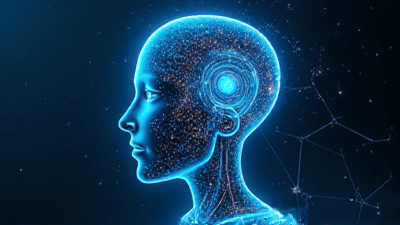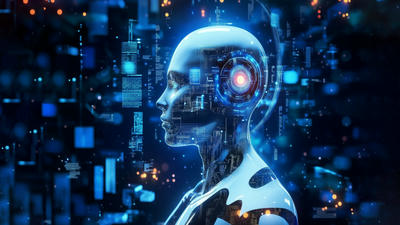
Artificial Intelligence (AI) has rapidly evolved from a theoretical concept into a pivotal force shaping industries, economies, and everyday life. As we look toward 2025, the implications of AI are becoming increasingly significant, influencing everything from healthcare and finance to education and entertainment.
Understanding Artificial Intelligence
What is AI?
Artificial Intelligence refers to the simulation of human intelligence processes by machines, particularly computer systems. These processes include learning, reasoning, problem-solving, perception, and language understanding. AI encompasses a range of technologies, from machine learning and natural language processing to robotics and computer vision.
The Growth of AI
The growth of AI has been propelled by several factors:
-
Data Explosion: The proliferation of data generated by digital interactions has created vast resources for training AI algorithms, leading to more sophisticated and accurate models.
-
Advancements in Computing Power: The increase in computational power, especially with the development of graphics processing units (GPUs) and cloud computing, has made it feasible to process large datasets efficiently.
-
Investment and Research: Significant investment from both public and private sectors has fueled research and innovation in AI, leading to groundbreaking developments.
AI in Different Sectors
As we move toward 2025, AI is expected to make significant strides across various sectors, including:
1. Healthcare
AI is transforming healthcare by improving diagnostics, personalizing treatment plans, and enhancing patient care.
Enhanced Diagnostics
AI algorithms are increasingly used for analyzing medical images, such as X-rays and MRIs. These systems can detect anomalies with a high degree of accuracy, often surpassing human performance.
Personalized Medicine
AI enables the analysis of genetic information and patient data to develop personalized treatment plans. This approach increases the effectiveness of treatments and minimizes side effects.
Virtual Health Assistants
The rise of AI-powered virtual health assistants is making healthcare more accessible. These assistants can provide medical advice, schedule appointments, and manage patient records, reducing the burden on healthcare professionals.
2. Finance
The financial sector is leveraging AI to optimize trading strategies, enhance customer service, and detect fraud.
Algorithmic Trading
AI algorithms can analyze market data in real time, making swift decisions that improve trading outcomes. These systems can identify trends and execute trades faster than human traders.
Customer Service Automation
Many banks and financial institutions are adopting chatbots and virtual assistants to handle customer inquiries. These AI-driven solutions provide round-the-clock support and streamline customer interactions.
Fraud Detection
AI's ability to analyze vast amounts of transaction data helps in identifying and preventing fraudulent activities. Machine learning models can detect unusual patterns and alert institutions to potential risks.
3. Education
AI is reshaping the educational landscape by personalizing learning experiences and improving administrative efficiency.
Personalized Learning
AI systems can adapt educational content to meet individual students' needs. By analyzing learning patterns, these systems can offer tailored resources and feedback, enhancing student engagement and performance.
Administrative Efficiency
AI can assist educational institutions in managing administrative tasks, such as enrollment processes, grading, and scheduling. This automation allows educators to focus more on teaching and less on paperwork.
4. Transportation
The transportation industry is experiencing a revolution thanks to AI, particularly with the development of autonomous vehicles.
Autonomous Vehicles
Self-driving cars are one of the most exciting applications of AI. Companies like Tesla, Waymo, and others are investing heavily in autonomous technology, which has the potential to reduce accidents, improve traffic flow, and enhance mobility for all.
Traffic Management
AI can analyze traffic patterns in real time, optimizing signal timings and reducing congestion. Cities are increasingly adopting AI-driven traffic management systems to improve urban mobility.
5. Entertainment
AI is changing the way we create and consume content in the entertainment industry.
Content Recommendation
Streaming platforms like Netflix and Spotify utilize AI algorithms to analyze user preferences and viewing habits. This technology enables personalized content recommendations, enhancing user experience.
Content Creation
AI is also being used in content creation, with tools capable of generating music, writing scripts, and even producing visual art. These developments open up new avenues for creativity, but also raise questions about authorship and authenticity.

The Ethical Implications of AI
As AI becomes more integrated into our lives, ethical considerations surrounding its use are gaining prominence.
Data Privacy
The vast amount of data required for AI systems raises concerns about privacy and data protection. As organizations collect and process personal information, ensuring its security and ethical use is paramount.
Bias and Fairness
AI systems can be susceptible to biases present in the training data. Discriminatory algorithms can yield unfair outcomes, particularly in areas like hiring, lending, and law enforcement. Developing fair and unbiased AI systems is a critical challenge.
Job Displacement
The rise of AI and automation may lead to job displacement in certain sectors. As machines take over routine tasks, reskilling and upskilling the workforce become essential to ensure individuals can adapt to changing job landscapes.
The Future of AI: Key Trends for 2025
As we look ahead to 2025, several key trends will shape the development and implementation of AI:
1. Human-AI Collaboration
The future will likely see increased collaboration between humans and AI systems. Rather than replacing human jobs, AI will serve as a powerful tool, augmenting human capabilities and enhancing decision-making.
2. Explainable AI
As AI systems become more complex, the need for transparency and interpretability will grow. Explainable AI focuses on making AI decisions understandable to humans, which is crucial for building trust and accountability.
3. AI in Climate Action
AI will play a crucial role in addressing climate change by optimizing energy consumption, improving resource management, and enhancing predictive models for climate patterns. AI-driven innovations will be fundamental in developing sustainable practices.
4. Advanced Natural Language Processing
The development of natural language processing (NLP) technologies will continue to advance, enabling more sophisticated interactions between humans and machines. AI systems will become better at understanding context, tone, and emotion in communication.
5. Regulatory Frameworks
As AI technologies proliferate, governments and organizations will need to establish regulatory frameworks to ensure ethical use and accountability. Collaboration between stakeholders is essential to create guidelines that promote responsible AI development.
Conclusion
The future of AI is bright, with immense potential to reshape industries and improve our quality of life by 2025. From healthcare innovations to advancements in transportation and education, AI is becoming an integral part of our daily lives. However, as we embrace the benefits of AI, we must also address the ethical challenges it presents to ensure a responsible and equitable future.
As we navigate this transformative landscape, collaboration between technologists, policymakers, and society will be vital in harnessing the power of AI for the greater good. By doing so, we can unlock a future where AI serves as a partner in progress, driving advancements that benefit all of humanity.



